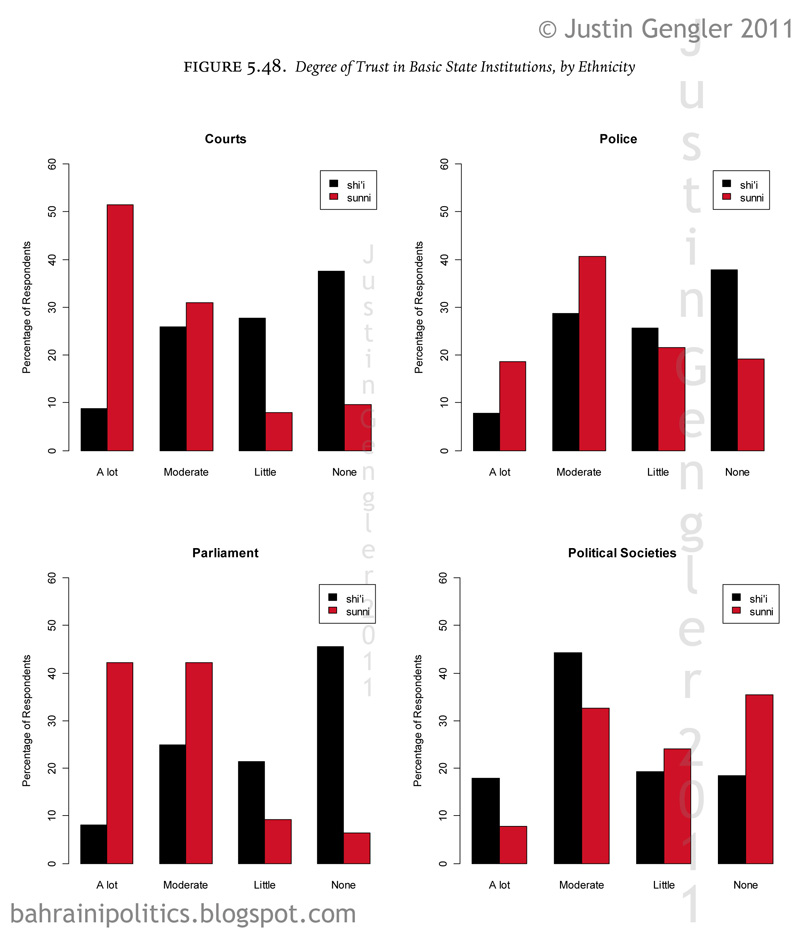We find below four graphs, each of which represents respondents' answers to a separate but related survey question. Bahrainis were asked to rate their level of trust in five basic state institutions: political societies, the police, the lower house of parliament (مجلس النواب), the courts and judges, and the prime ministership (الرئيس والوزراء). For now we will hold off on the last question, which obviously is the most sensitive of all of them.
The specific question asked was: "I am going to name a group of institutions, and I would like you to tell me to what extent you trust in each of these institutions. Do you trust in them to a large extent, to a moderate extent, little, or not at all?" In Arabic:
":سوف أقوم بتسمية مجموعة من المؤسسات، وأود أن تخبرني إلى أي درجة تثق في كل واحدة من هذه المؤسسات"
رئاسة الوزراء (الرئيس والوزراء) 1.
القضاء (المحاكم) 2.
مجلس النواب 3.
الأمن العام (الشرطة) 4.
الجمعيات (المنظمات) السياسية 5.
.أثق بها إلى درجة كبيرة , أثق بها إلى درجة متوسطة, أثق بها إلى درجة قليلة, لا أثق بها على الإطلاق

As we see immediately from the graphs here, ethnicity is a critical factor in explaining respondents’ trust in each of the institutions. In all cases, Sunni and Shi'i support for an institution tends to follow its relative power or advantage in that sphere. Thus we see that Sunnis express demonstrably more trust in the courts, police, and the parliament itself, but not in political parties (“societies”).
Why? Because there they are relatively outmaneuvered by al-Wifaq, which enjoys more widespread legitimacy among its constituents and high party discipline among members. Its continuing success was evidenced most recently in the 2010 parliamentary elections. Sunni parties, by comparison, though they nominally form a majority caucus, in fact are split between Salafis, Muslim Brothers, and a more heterogeneous contingent of Al Khalifa tribal allies from among various family groups. That Sunni respondents should express more ambivalence about political societies than Shi‘a is thus little wonder.
In similar fashion, the relatively low trust reported for the police by Sunni and Shi‘i alike is understandable when one recalls that although those who fill its ranks tend of course to be Sunnis, their most distinguishable trait is not their religion but that they are overwhelmingly "foreigners"--Pakistanis, Yemenis, Syrians, Iraqis, and so on--albeit perhaps foreigners with Bahraini citizenship. In this way--and this indeed is precisely the idea, or at least the intended idea--they identify neither with indigenous Bahraini Sunnis nor Shi‘is, and vice versa, but are loyal only to the state itself.
Go to Part 3 (اذهب إلى الجزء الثالث) —>
Justin,
ReplyDeleteA very interesting & informative survey. I think I can more-or-less figure how the fifth graph will look given that Sh. Khalifa bin Salman is on record as saying there's no such thing as an hilal dog when referring to his Shi'i subjects!
Keep it up.
M.